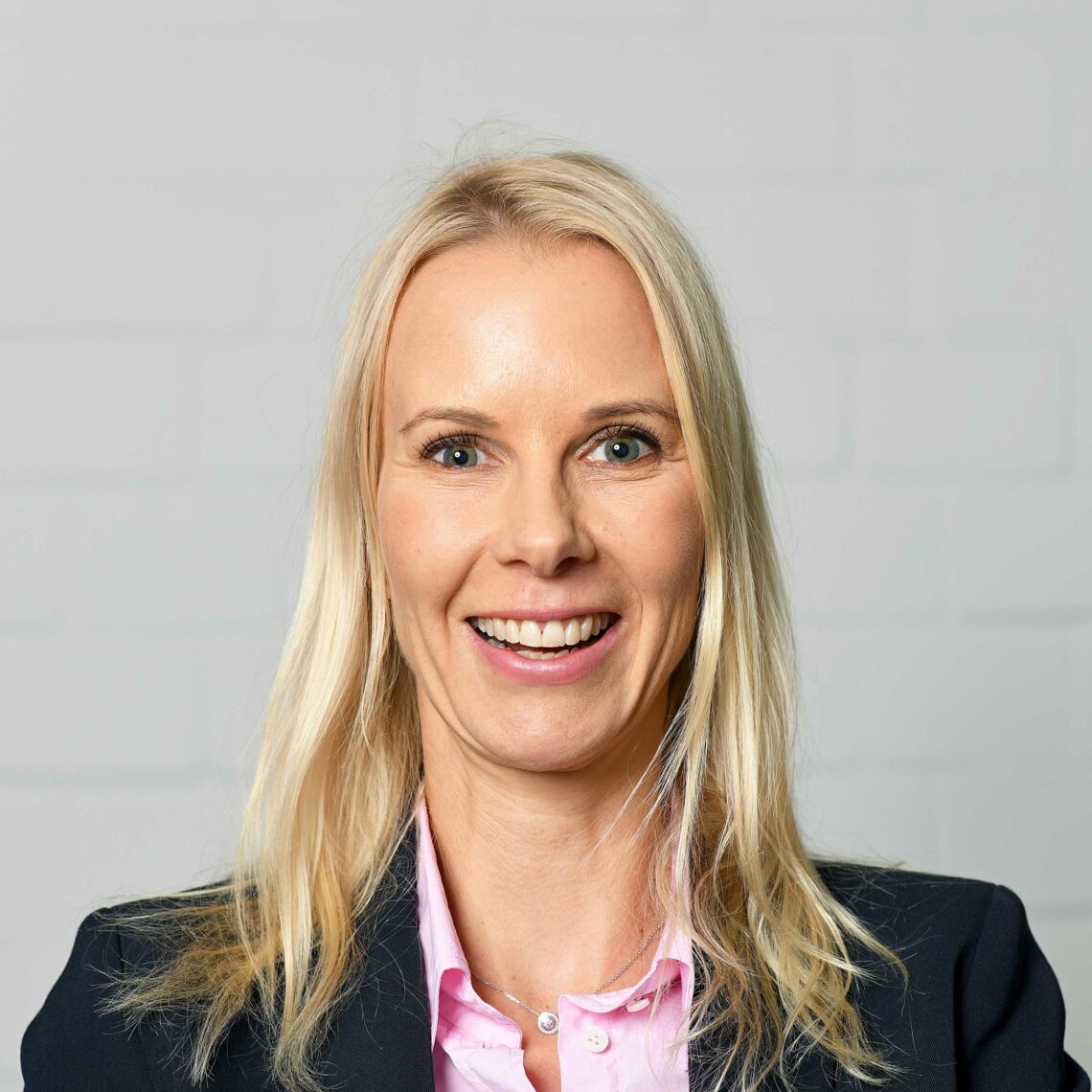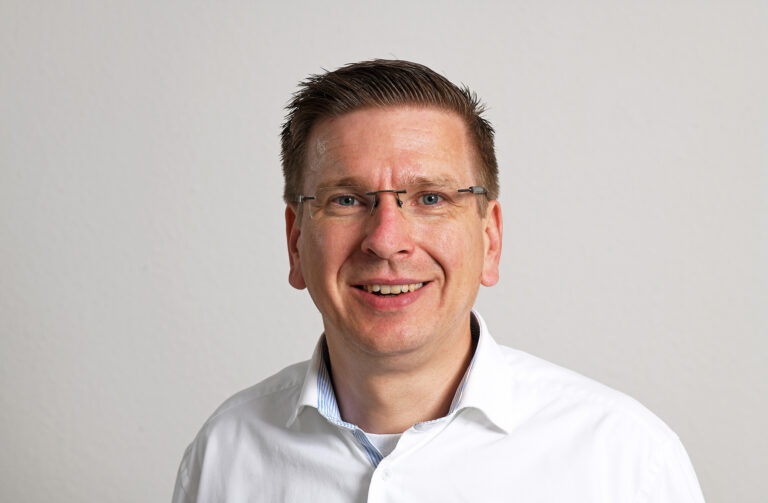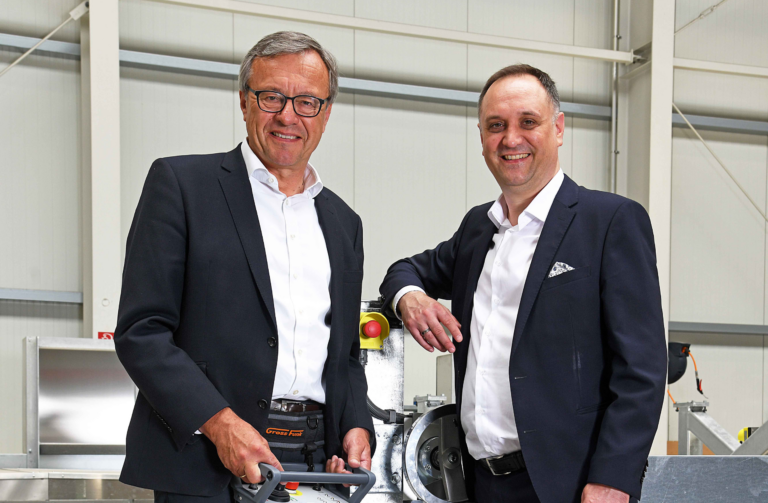Fruit gums, hard caramel, toffees, lollies: young people starting their training in the “sweet factory” soon find themselves immersed a world of sweetness. But SweetTec, ToffeeTec and Ragolds do more than just make their temptingly sweet products. They also offer young talents a great melange that makes the start of their working lives easier. Every year, about 20 young people start training in one of twelve different vocations with the confectionery manufacturer in Boizenburg, one of the big players in the food industry. The group has meanwhile more than 700 employees, with an average age of only 38 years.
“On the one hand, we have employees who joined us when we started up back in 2002 and are now gradually taking retirement. On the other hand, our sweet family also has lots of young people. Some of them are children of employees”, explains Sonja Schindler. The 49-year old deals with communication and organisation, and is responsible for HR as a member of the management team. “This didn’t happen by chance. Many years ago we received hampers full of applications. In 2021, we noticed a sharp decline. I wanted to understand the reasons why.” One thing the committed human resources practitioner came to understand: “Trainees had to satisfy very traditional expectations. People who forgot to attach a CV to their application weren’t even invited to an interview. But what kind of valuable information can you expect a school-lever to put in their CV?” asks Sonja Schindler, shaking her head. She describes her approach that has now become well established as part of a rethinking process.
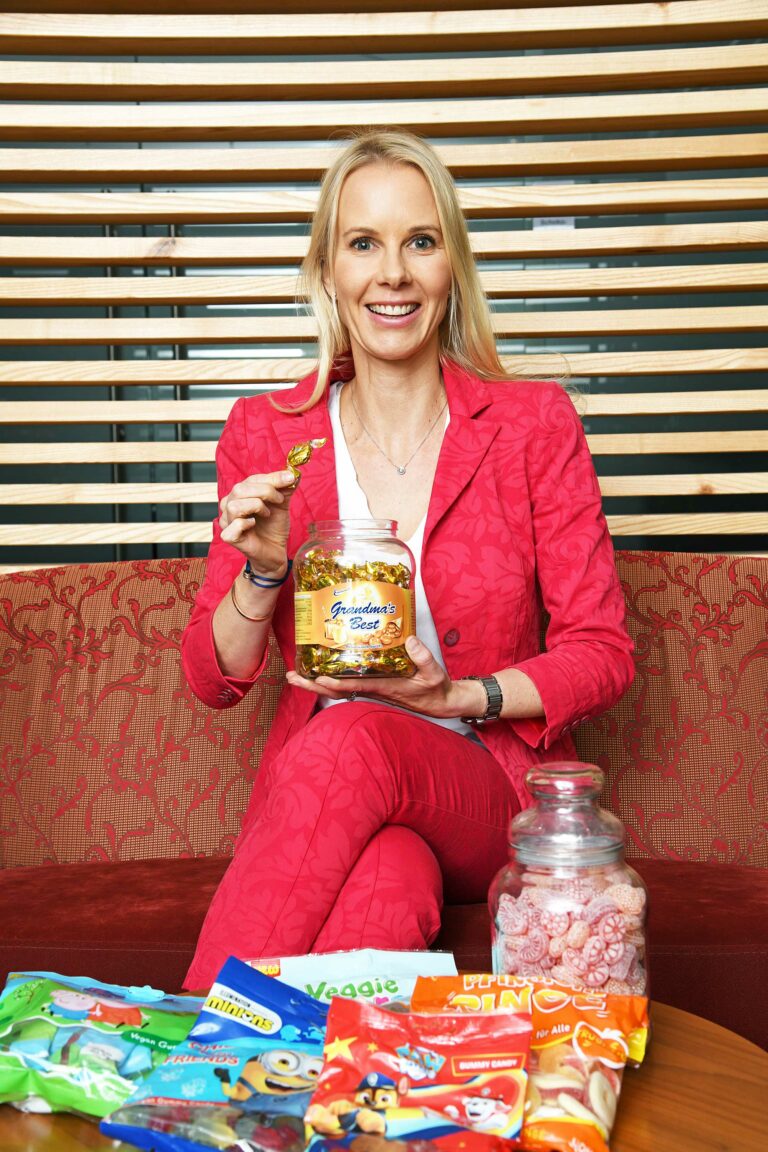
Companies court young talents
“We have to approach young people”, says the HR manager. It starts with career guidance events and continues by keeping close contact with the schools and maintaining a pro-active dialogue with teachers. “If I start to introduce the job of a plant and machine operator by talking about production and shift work, then I’m telling them everything that makes a company unpopular.”
Instead, the manager meets potential applicants at eye-level, brings a few company trainees and takes them all on a tour of the company. To finish, they all have a chance to make their own fruit gums. “I want the youngsters to see what’s in store for them, let them get a feel for the workplaces and the mood in the teams.” Sonja Schindler is obviously enthusiastic about “her” trainees. She knows them all, and usually also the stories behind the young people. Being on first-name terms enhances the community spirit, with mutual respect underlying the way people treat each other in the family-run company.
“I invite every applicant to make personal contacts so they can get to know the young people.” Those who are not so good at maths and have given up on foreign languages but love tinkering with tools and machines will be given a chance and find the necessary acceptance. “They’ll probably need plenty of support with their college work. One of our production managers helps with extra coaching. I’m sure that this is a way to develop great employees.” The company recently hired a training supervisor who spends all their time supporting the industrial trainees, and acts as their go-to person. But a company also has to be in a position to shoulder the added costs involved. “We’re glad we can do this and are convinced of the added value this will bring.”
The HR specialist is also convinced by the Immigration Act for Skilled Workers. She’s already thinking about tackling aspects such as accommodation, language and culture. After all, there are not enough skilled workers for the future in the local workforce, and there are definitely not enough young people available.
A company must be able to handle such additional costs first. “We are pleased to achieve this and are convinced of the added value.” The HR specialist is also convinced of the Skilled Workers Immigration Act. She is already considering aspects such as housing, language, and culture. Because: The local workforce potential is not sufficient for the future. There are definitely far too few young people.
Gap between theory and practice
„Wir sind erneut als TOP-Ausbildungsbetrieb der IHK geehrt worden. Allerdings ist es nicht immer einfach, einen hohen Standard in der Berufsausbildung zu halten. Denn momentan macht uns gerade die mangelnde Versorgung von Lehrkräften an den Berufsschulen große Sorgen. Einige Fächer – bei Industriekaufleuten zum Beispiel Deutsch – sind nicht besetzt.“ Die Unternehmerin drängt darauf, an den Schulen und in der Politik auf Veränderungen hinzuwirken. „So lange nichts passiert, müssen wir fehlende Inhalte selbst abbilden. Schließlich sollen unsere Azubis ihre Prüfung schaffen.“
Everyone starts at the bottom of the ladder
Von wegen! „Dieser Satz ist bestimmt noch in einigen Köpfen verankert. Das finde ich wirklich schlimm! Wir dürfen bei all unseren Bemühungen nicht vergessen, dass wir junge Menschen für die Zukunft unserer Unternehmen ausbilden. Deshalb muss das Lernen gut und spannend gestaltet sein, Spaß machen, fordern und das Miteinander stärken. Sonja Schindler selbst hat nach dem Abitur eine klassische Bankausbildung absolviert. „Damals war es oft so, dass man hin- und hergeschoben wurde zum Aushelfen in unterbesetzten Abteilungen“, erinnert sie sich. Nebenberuflich studierte die junge Frau – abends und am Wochenende – an der Bank-Akademie. „So eine extreme Anstrengung würde heute wohl keiner mehr auf sich nehmen“, sagt die Betriebswirtin. „Ich bin froh über meine duale Ausbildung. Das war eine gute Kombination zwischen praktischen und theoretischen Anteilen. Sie versetzte mich in die Lage, in jeder Abteilung einer Bank durchzustarten. Ich konnte für mich feststellen, was mir am meisten liegt. Das wäre nur mit der Theorie des Studiums nicht möglich gewesen.“

Make them want to learn more
Aus dieser Erfahrung hat Sonja Schindler gelernt. „Für unsere kaufmännischen Azubis gibt es in jeder Abteilung Ausbildungsbeauftragte. Der Arbeitstag beinhaltet spannende Aufgaben. Klar gehört auch mal die Ablage dazu. Wichtiger sind motivierende Momente. Wir achten darauf, dass wir viele Lehrinhalte vermitteln und lassen die jungen Leute alle drei Monate die Abteilungen wechseln.“ Nach der Ausbildung warten Fortbildungsmöglichkeiten wie die Meisterausbildung im produzierenden Bereich, die Fachausbildung oder alternativ die Entwicklung zur Führungskraft. Junge Kaufleute können nebenberuflich ihren Bachelor/Master oder Rüstzeug für größere Verantwortung als Führungskraft erwerben. Berufliches Vorankommen und Karriere spielen in einer Region, in der es um jeden einzelnen geht, eben auch eine Rolle.
„Wir brauchen Fachkräfte, die Lust haben, mit uns diesen Weg zu gehen, um neue Märkte zu erobern.“ Die Boizenburger sind dabei innovativ und kreativ unterwegs. Der Fruchtgummimarkt weist eine positive Wachstumsprognose auf. „Neue zuckerfreie oder vegane Produkte oder solche mit Vitaminen und Proteinen bereichern unser Portfolio bereits. Kürzlich haben wir einen Versuch gestartet und ein Kaubonbon mit Kollagen angereichert. Das ist gut für Haut, Haare und Nägel und kam insbesondere bei den Frauen gut an.“
Exciting projects and benefits
Sonja Schindler and her team are always finding new ways of being convincing. “As part of a project, our trainees are given responsibility for the factory shop or for the social media channels”. This enhances mutual trust and confidence.
The family-run confectionery manufacturer also finds other ways to express appreciation. Employees can use the company’s sports facilities covering 800 square metres almost on a 24/7 basis and arrange to meet colleagues to do some weight training together. Electric scooters are provided for travelling between the three sites so that even those younger than 18 can get from A to B. The company also provides accommodation for three trainees in a flat share to compensate for the lack of mobility services in this rural region. “We’ve rented a flat for this purpose and furnished it with modern furniture. It’s near enough for them to cycle to work.”
A polo shirt with a motif printed on it, health days with massages and nutrition advice that comes with recipes and the necessary ingredients as well – “I like surprising the employees with things they don’t expect”, says Sonja Schindler. These include a summer party in Hamburg Beach Club, or the company app that networks everyone on their phones, including a private sales platform and info channel.
People seem to like the mixture, as reflected in the employer rating site kununu: “SweetTec is a modern employer with a vision. There’s a pleasant, really friendly atmosphere in the teams.” Five stars, in other words, an outstanding rating that honours all the efforts made to enhance employee loyalty.
In Schwerin CCI district, 1,261 contracts were concluded with trainees in 93 different vocations for the 2023 training year. These also included 120 training contracts with foreign youngsters from 31 different countries. “Training makes more of us” is the CCI’s nationwide campaign that addresses young people and encourages them to turn life hacks into a job and become “really good at something”. “Jetzt#Könnenlernen“ (learn to do it now) is the striking appeal to future job starters, in an effort to close the baby boomer gaps.
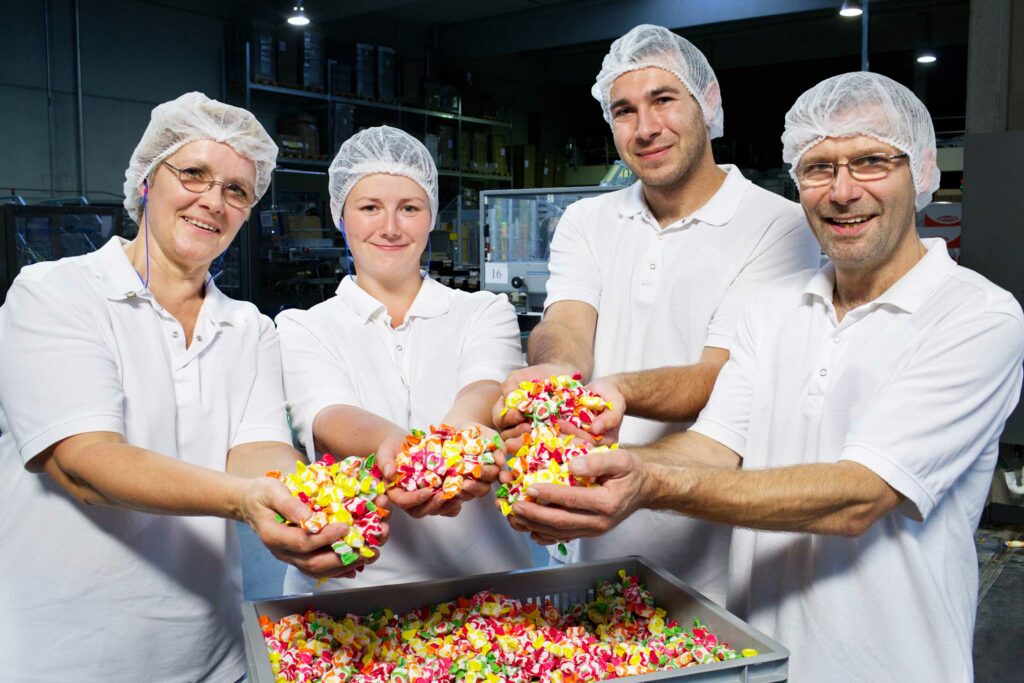
Food Academy – mastering challenges together
Food manufacturers came together at an early point in time in the struggle for workers and skilled specialists, with the joint intention of instigating changes. “Some people laughed at us back then when we drew attention to the emerging situation on the labour market”, recalls Sonja Schindler. In November 2014, seven companies from Western Mecklenburg joined forces with the Wirtschaftsförderungsgesellschaft Südwestmecklenburg GmbH to set up the Food Academy. Since then, the association has focused on the high demand for skilled specialists and young talents in Mecklenburg-Western Pomerania’s food industry.
Meanwhile 21 companies with more than 3,500 employees are involved in the association. The Boizenburg confectionery manufacturer has played an active role right from the start, providing further training opportunities to enhance the appeal of the food industry. “Further training for executives is about procuring good instructors and offering possibilities for sharing.” For example, about the association’s own training scheme for digitalisation managers to bring more digitalisation into the companies, overcoming resistance and encouraging everyone to get involved. It’s exciting to see how interested trainees are in digitalisation. After all, they are growing up in the digital age.

